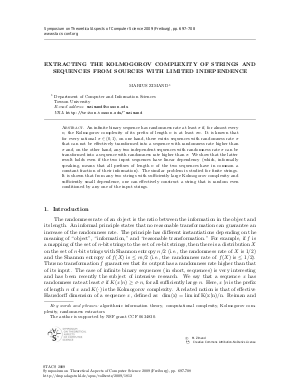Extracting the Kolmogorov Complexity of Strings and Sequences from Sources with Limited Independence
Author Marius Zimand
-
Part of:
Volume:
26th International Symposium on Theoretical Aspects of Computer Science (STACS 2009)
Part of: Series: Leibniz International Proceedings in Informatics (LIPIcs)
Part of: Conference: Symposium on Theoretical Aspects of Computer Science (STACS) - License:
 Creative Commons Attribution-NoDerivs 3.0 Unported license
Creative Commons Attribution-NoDerivs 3.0 Unported license
- Publication Date: 2009-02-19
File

PDF
LIPIcs.STACS.2009.1812.pdf
- Filesize: 179 kB
- 12 pages
Document Identifiers
Subject Classification
Keywords
- Algorithmic information theory
- Computational complexity
- Kolmogorov complexity
- Randomness extractors
Metrics
- Access Statistics
-
Total Accesses (updated on a weekly basis)
0PDF Downloads0Metadata Views
Abstract
An infinite binary sequence has randomness rate at least $\sigma$ if, for almost every $n$, the Kolmogorov complexity of its prefix of length $n$ is at least $\sigma n$. It is known that for every rational $\sigma \in (0,1)$, on one hand, there exists sequences with randomness rate $\sigma$ that can not be effectively transformed into a sequence with randomness rate higher than $\sigma$ and, on the other hand, any two independent sequences with randomness rate $\sigma$ can be transformed into a sequence with randomness rate higher than $\sigma$. We show that the latter result holds even if the two input sequences have linear dependency (which, informally speaking, means that all prefixes of length $n$ of the two sequences have in common a constant fraction of their information). The similar problem is studied for finite strings. It is shown that from any two strings with sufficiently large Kolmogorov complexity and sufficiently small dependence, one can effectively construct a string that is random even conditioned by any one of the input strings.
Cite As Get BibTex
Marius Zimand. Extracting the Kolmogorov Complexity of Strings and Sequences from Sources with Limited Independence. In 26th International Symposium on Theoretical Aspects of Computer Science. Leibniz International Proceedings in Informatics (LIPIcs), Volume 3, pp. 697-708, Schloss Dagstuhl – Leibniz-Zentrum für Informatik (2009)
https://doi.org/10.4230/LIPIcs.STACS.2009.1812
BibTex
@InProceedings{zimand:LIPIcs.STACS.2009.1812,
author = {Zimand, Marius},
title = {{Extracting the Kolmogorov Complexity of Strings and Sequences from Sources with Limited Independence}},
booktitle = {26th International Symposium on Theoretical Aspects of Computer Science},
pages = {697--708},
series = {Leibniz International Proceedings in Informatics (LIPIcs)},
ISBN = {978-3-939897-09-5},
ISSN = {1868-8969},
year = {2009},
volume = {3},
editor = {Albers, Susanne and Marion, Jean-Yves},
publisher = {Schloss Dagstuhl -- Leibniz-Zentrum f{\"u}r Informatik},
address = {Dagstuhl, Germany},
URL = {https://drops.dagstuhl.de/entities/document/10.4230/LIPIcs.STACS.2009.1812},
URN = {urn:nbn:de:0030-drops-18128},
doi = {10.4230/LIPIcs.STACS.2009.1812},
annote = {Keywords: Algorithmic information theory, Computational complexity, Kolmogorov complexity, Randomness extractors}
}
